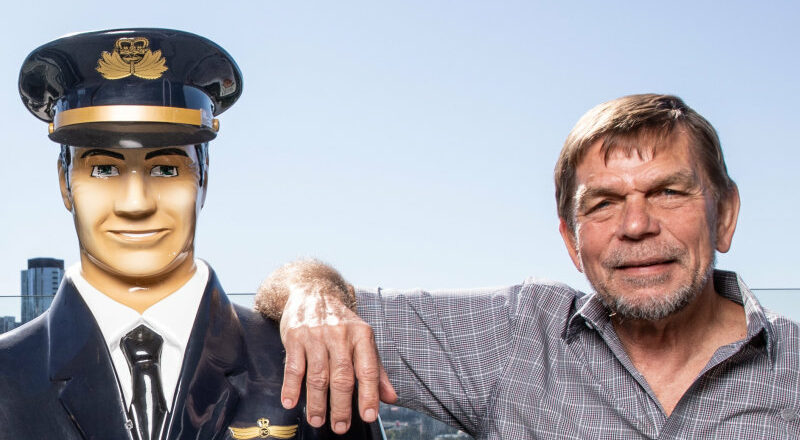No performing animals in Flight Centre’s sustainability push
Save articles for later
Add articles to your saved list and come back to them any time.
The founder of Topdeck Tours, Graham Turner chanced fate by participating in no fewer than three Running of the Bulls in the 1970s.
After all, the “scary” Pamplona fixture was a rite of passage for the riotous 18-to-35s crowd that Topdeck ferried around Europe in its rickety double-decker buses.
Flight Centre CEO Graham Turner says that without a technological breakthrough, there’s “not a chance” the aviation sector can achieve net-zero by 2050 without the use of carbon offsets.Credit: AFR
“In the early 1970s Running of the Bulls was a big thing, but we cut that out of our Topdeck tours ten years ago,” says Turner, the founder and CEO of Flight Centre, which owns Topdeck. “It’s amazing how things change over a relatively short period of time.”
These days, organised tours involving elephant rides or performing animals are also off the Flight Centre itinerary – as is anything related to modern slavery or “orphanage tourism”.
As a predominantly retail operation – albeit a sprawling one with a presence in 14 countries – Flight Centre’s own (scope one) carbon emissions are relatively insignificant and reduced further with measures such as sensor lighting and automated switching off signage.
But as one of the world’s biggest travel agents, Flight Centre is in a cockpit position to influence consumer attitudes to sustainability issues such as animal cruelty, reducing hotels’ plastic waste and carbon-conscious flying.
“We can look at where people stay, how they travel to make sure they stay in more sustainable hotels … and also try to make sure people aren’t travelling unnecessarily,” Turner says.
Turner says much of the pressure is coming from corporate customers, who account for about half of Flight Centre’s business. “Sustainability issues are becoming much more significant, and they are always part of our pitch for corporate accounts,” he says.
Counter-intuitively for a travel agent, Flight Centre encourages companies to cut out unnecessary trips that can be satisfied by videoconferencing or combining two journeys into one.
Turner says promoting minimalism is actually good business: a corporate account might spend millions of dollars a year on travel, so if sustainability saves money that’s more reason for them to stick with Flight Centre.
Sustainable aviation fuel can help the aviation industry get closer to net-zero.
While tourism can be a force for good in terms of raising the standard of living of impoverished communities, it also raises myriad issues such as pollution, exploitation and widening existing wealth disparities.
Flight Centre’s ethos is to “support responsible tourism, conservation of natural resources and sustainability in general”.
The company works with preferred suppliers and tour operators to promote responsible holidays and offers tours based on social and environmental causes and volunteering.
In an educative vein, Flight Centre’s “truth about” website tackles the issues such as animal cruelty and water and plastic waste, which customers might be “inadvertently exacerbating” during their travels.
But while elephant rides are off the schedule, the pachyderm in the room is how the hard-to-abate aviation sector will meet its target of achieving net-zero emissions by 2050.
Turner says that without a technological breakthrough, there’s “not a chance” the sector can achieve this without the use of carbon offsets such as tree-planting schemes.
He notes that Qantas is aiming for a 10 per cent mix of biofuels and renewables by 2030, while other airlines are researching fossil fuel alternatives and ordering newer fuel-efficient planes.
But these alternatives currently are much more expensive than standard aviation fuel and “it’s probably too soon post-COVID to clearly understand what airlines are more environmentally advanced”.
In the future, Flight Centre is likely to choose partner airlines, hotels and tours based on formal sustainability criteria. Meanwhile, the company has links with environmental groups to provide customers with emissions offset options.
Turner says while the sustainability standards of hotels are highly variable, the sector is moving in the right direction even if banishing plastic shampoo bottles and re-using towels amount to plucking the low-hanging fruit.
Sometimes the agent takes matters into its own hands. In eastern Bali, Flight Centre has set up Kaura Bali, a hotel venture with the local community at Manggis due to open shortly. Flight Centre built the facility on a ten-year lease, but in effect, the facility is owned by the locals.
“It’s a very green thing, it’s a tented site that only employs locals, and it gives tourists a view of the local culture and countryside,” Turner says. “Locals get good employment without having to go to [Bali’s capital] Denpasar.”
As an antidote to tourism’s often shabby reputation, the company is now eyeing similar opportunities elsewhere in Indonesia, as well as Thailand and Malaysia.
“Generally, tourism is a force for good more and more of the time, but there is still a long way to go,” he says.
- Advice given in this article is general in nature and is not intended to influence readers’ decisions about investing or financial products. They should always seek their own professional advice that takes into account their own personal circumstances before making any financial decisions.
The Business Briefing newsletter delivers major stories, exclusive coverage and expert opinion. Sign up to get it every weekday morning.
Most Viewed in Money
From our partners
Source: Read Full Article



